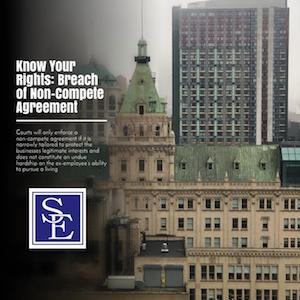OF DISCRIMINATION AND HARASSMENT
Breach of Non-Compete Agreement
The first step in determining whether an employer can restrict a former employee’s post separation employment or other business activity, is analyzing the terms and conditions of the employment agreement that includes the restrictive covenants at issue. If there is no agreement that evidences the employee’s agreement to any post-separation activities, the employer has no legal right to interfere with the employee’s post-separation employment activities unless the employee breached common law of committed a criminal act against the former employer.
In order for an enforceable contract, there must be a meeting of the minds on specified terms or conditions. To establish the existence of a contract, an employer must show that it communicated the terms of the agreement, the employee accepted the terms of the agreement, the agreement was based upon mutual consideration, and the terms of the agreement were reasonably certain. In order for there to be a meeting of the minds, both the employer and employee must understand what each is agreeing to do or agreeing not to do. In other words, there cannot be any secret or hidden intention or understanding of one party over the other party.
There also must be both an offer and an acceptance. This requires the offer to be clear, definite, and certain on all its essential terms and an acceptance that is evidenced by a clear intent to agree to the offer, either by words or conduct.
There must also be consideration. Under current New Jersey, continued employment is sufficient consideration for enforcement of a restrictive covenant. This means that your employer can require you to sign a no compete agreement or restrictive covenant after you have already started your employment and that your continued employment is sufficient consideration to later enforce that agreement.
Finally, the agreement must include terms that are sufficiently clear so that the employee knows what he or she can and cannot do after the employment relationship is ended.
While employment agreements that include no compete agreements can be enforced just as any other contracts, New Jersey courts do treat them differently than other contracts. This is because New Jersey law maintains a strong public policy affording individuals the right to pursue one’s profession and livelihood. A covenant not to compete after the termination of an individual’s employment is subject to judicial disfavor as potential restraints on trade. In order for an employer to be able to enforce a non-compete against a former employee, the employer must show that the restraints are reasonable and protect the legitimate interests of the employer.
An agreement not to compete or other restrictive covenant will be enforceable if it: (1) protects the legitimate interests of the employer; (2) imposes no undue hardship on the employee; and (3) is not injurious to the public. Restricting competition is not a legitimate business interest. In other words, if an employer is simply looking to extinguish competition by stopping a former employee from working in a certain job, a court will not enforce it. The non-compete or other restrictive covenant must also not be unduly burdensome to the employee.
At least one New Jersey Court has suggested that a non-compete will be unenforceable if an employee loses their job as a result of the employer breaching an employment agreement or acts to the detriment of the public interest. A non-compete or other restrictive covenant can also not be injurious the public. For example, restrictions on doctors to provide care to patients are often subject to increased judicial scrutiny because of restricting patients ability to receive medical care from the doctor of their choice is important public policy. Attorneys cannot be restricted by non-compete agreements because our law recognizes a person’s right to an attorney of their own choosing.
Once the existence of a non-compete agreement or other restrictive covenant is established, the next inquiry is whether the employee has breached the agreement in their post-termination activities. This is a fact sensitive inquiry that requires an extensive review of the employee’s job duties with the prior job, the terms and conditions of the agreement and analysis of the employees job duties with the new employer. An employer cannot restrict any employee’s post-termination activity unless it can show that it has an enforceable contract prohibiting such activities or can show that the employee breached his or her fiduciary duty of duty of loyalty during their employ. The latter can occur when an employee begins working for a competitor while still employed with the former employer or has stolen confidential documents and is using it against the former employer. These cases can give rise to claims of unfair competition, breach of fiduciary duty, breach of loyalty or other even criminal actions for theft.
Many times, our New Jersey employment lawyers are able to negotiate an amicable resolution on behalf of employees with their former employer that allows the employee to remain employed and pursue their livelihood, while protecting the former employer’s legitimate business interests. If you have a non-compete or other restrictive covenant, please contact our Holmdel law office to speak to one of our Non-Compete lawyers about the specific facts and circumstances of your post-termination job restrictions.






